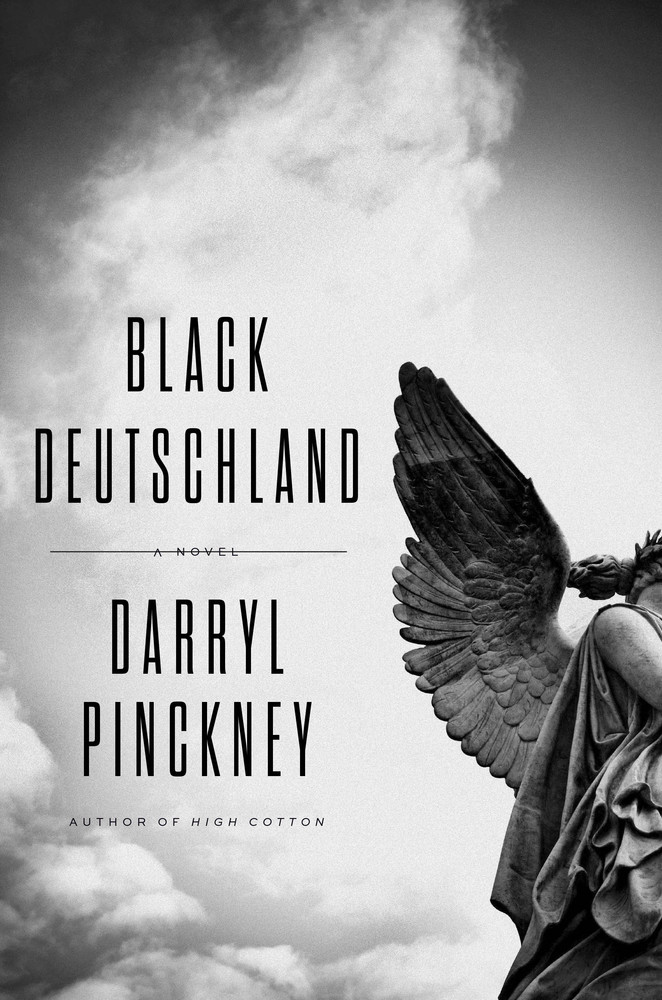‘Black Deutschland’ by Darryl Pinckney

Author: Brett Josef Grubisic
February 13, 2016
The distinctive voice narrating Black Deutschland compels an audience to listen. Coupled with the foregrounded erudition and the seen-it-all, felt-it-all, tried-it-all, and lost-it-all world-weariness, there’s a nocturnal theatricality in ample evidence, a stylized posture that would not seem out of place in a cabaret performance. “Guten abend, meine Damen und Herren,” the well-past-youthful performer might begin, spotlit on a bar stool but otherwise unaccompanied on a tiny curtained stage. “Let me tell you of my former days, of my not untroubled stay in a grey and wintry German city, of fleeting love and enduring loss, of the night the Wall fell. Long ago, I foolishly dreamed of being Christopher Isherwood’s spiritual heir and becoming a rootless stranger in Berlin who seduced tough German boys. But. Ja, natürlich, there’s a but. We’re all aware of the best laid schemes of mice and men. With that perennial theme now introduced, drink up! Let your time here tonight be well spent as I reveal my artful tale of woe.”
That voice is intriguing all the more because Pinckney doesn’t reveal much about its circumstances relative to the episodes being described. Belonging to Jedediah ‘Jed’ Goodfinch circa 2014, the voice is recalling a shuffled series of events (from childhood to the late 80s) that mainly took place over a handful of years, right after Jed left behind family, excesses of drugs and alcohol, rehab, failure, shame, and a completed but best forgotten stage of adulthood in Chicago. What happened between 1989, the year at which Jed’s reminisces formally conclude, and the present day he narrates from remains a mystery. He’s clearly looking back without much nostalgia or even fondness at his younger self, his bad, misguided, and impulsive choices, and the indifferent cities that housed him. Despite closing in on sixty and having moved on, he’s also stalled and solitary, “one of the black American leftovers who sit by themselves” in the once-divided city. The mature man who’s scrutinizing actions over two decades in the past appears ambivalent—disdainful and unforgiving without a doubt and yet drawn to sifting through the rubble nonetheless. It’s dramatically fruitful strategy on Pinckney’s part.
To simplify a complex and multifaceted story, Pinckney’s second novel (his first, High Cotton, appeared in 1992) traces an iffy journey of questionable rehabilitation. “I may have fallen apart in the city of my birth,” Jeb remarks, “but the city of my rebirth would see me put back together.” Beckoned by the glowing Mercedes star in the city’s Zoo Quarter, Jeb expects to become “the black American expatriate,” a historically unburdened, if imaginary, figure he admires. This former fat kid with a voracious taste for white wine and cocaine is thirty-three days sober. A drop out who’s no example of “Negro Achievement,” a quality much praised (and desired) by his politically active and expectant parents, he arrives with romantic faith in “Isherwood promises” of freedom grasped and erotic desires realized. Jeb’s sure he’s about to begin an “adult life” marked by seriousness, accomplishment, and cultured successes.
Soon hired to work on a book with an acclaimed architect who’s spearheading West Berlin’s makeover, Jeb resides with his imposing, well-connected, and AIDS-fearing cousin Cello and senses he’s at “the gates of international cool.”
Nothing’s that easy, of course. Frightened by his weaknesses for “disco trash” and intoxicants (but proud that he’s no longer “white wine’s bitch”), Jeb turns his back on the gay “city of orgies and joy.” Sober, though, he “disappeared into the cushions”; he rightfully questions what the monkishness is in fact attaining: “I had not had a drink in more than a year, but I was twenty-eight years old and I had not been naked with another human being in an even longer time than I’d not had a drink.”
Despite AA meetings, A-list connections, and myriad good intentions, he begins sleeping from couch to couch and visiting the ChiChi, a never-closing bar specializing in “life-changing mistakes”: “It was the sort of place where people experiencing a bad night strayed in to finish things off with meltdowns, blackouts, fistfights, seizures. Sex was just a message afterthought, something to do when daylight hit.” Opportunities slow, friendships and family ties explode, drug use spikes upward, and “screwing above [his] sex grade,” Jeb loses a lover.
Clever, arch, bitter, thoughtful, sophisticated, and delightfully jaded, Jeb-the-elder makes what could be a real downer of a downward trajectory into a mesmerizing performance. Bad things keep happening to difficult, petty, conflicted, vain, and contradictory people, and thanks to Jeb’s carefully modulated voice, the tangles are also human messes to savor.
Black Deutschland
By Darryl Pinckney
Farrar, Straus and Giroux
Hardcover, 9780374113810, 304 pp.
February 2016

